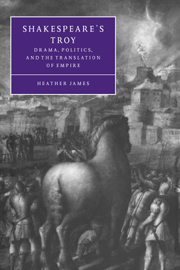Book contents
- Frontmatter
- Contents
- List of illustrations
- Acknowledgements
- Introduction: Shakespeare's fatal Cleopatra
- 1 Shakespeare and the Troy Legend
- 2 Blazoning injustices: mutilating Titus Andronicus, Vergil, and Rome
- 3 “Tricks we play on the dead”: making history in Troilus and Cressida
- 4 To earn a place in the story: resisting the Aeneid in Antony and Cleopatra
- 5 Cymbeline's mingle-mangle: Britain's Roman histories
- 6 “How came that widow in?”: allusion, politics, and the theater in The Tempest
- Notes
- Index
- Cambridge Studies in Renaissance Literature and Culture
1 - Shakespeare and the Troy Legend
Published online by Cambridge University Press: 29 October 2009
- Frontmatter
- Contents
- List of illustrations
- Acknowledgements
- Introduction: Shakespeare's fatal Cleopatra
- 1 Shakespeare and the Troy Legend
- 2 Blazoning injustices: mutilating Titus Andronicus, Vergil, and Rome
- 3 “Tricks we play on the dead”: making history in Troilus and Cressida
- 4 To earn a place in the story: resisting the Aeneid in Antony and Cleopatra
- 5 Cymbeline's mingle-mangle: Britain's Roman histories
- 6 “How came that widow in?”: allusion, politics, and the theater in The Tempest
- Notes
- Index
- Cambridge Studies in Renaissance Literature and Culture
Summary
“Ingenium par imperio”: the “Swan of Auon” and triumph of Britain
At least since the appearance of the First Folio, when Ben Jonson paid tribute to Shakespeare as the “Soule of the Age” and a poet “not of an age, but for all time,” it has seemed incumbent upon critics to champion Shakespeare for his ability either to represent history or to rise above it. Jonson, however, would be dismayed that his paradox about Shakespeare's art has come to underscore stubborn inconsistencies between Romantic transcendence and historical embeddedness, and disturbed at the notion that transcendent poetic skills detach the artist from history and politics. For a poet of Jonson's literary and social ambition, Shakespeare would most fully be the “Soule of the Age” when defying limitation in his own artistry and in England's political, geographical, and cultural borders. When Shakespeare bests the great dramatists of Greece and Rome, not to mention Elizabethan England, his credit wondrously affects England as an emergent nation. At the thematic and numerical center of his poem, Jonson dramatically shifts his address from Shakespeare to England itself. He moves – abruptly or seamlessly, depending on how prepared one is for conflations of art and politics – from Shakespeare's excellence in the theater to a political scene in which Britain personified triumphs over European rivals for cultural prestige:
Leaue thee alone, for the comparison
Of all, that insolent Greece, or haughtie Rome
Sent forth, or since did from their ashes come.
Triumph, my Britaine, thou hast one to showe,
To whom all Scenes of Europe homage owe.
He was not of an age, but for all time!
- Type
- Chapter
- Information
- Shakespeare's TroyDrama, Politics, and the Translation of Empire, pp. 7 - 41Publisher: Cambridge University PressPrint publication year: 1997

